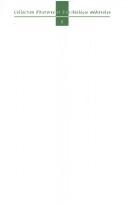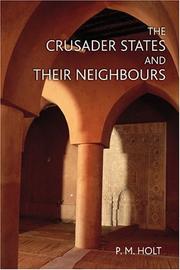| Listing 1 - 10 of 28 | << page >> |
Sort by
|
Book
ISBN: 1783169265 9781783169269 9781783169252 1783169257 1783169249 9781783169245 9781783169245 Year: 2016 Publisher: Cardiff University of Wales Press
Abstract | Keywords | Export | Availability | Bookmark
 Loading...
Loading...Choose an application
- Reference Manager
- EndNote
- RefWorks (Direct export to RefWorks)
Written to celebrate the prestigious career of Professor Denys Pringle, this collection of articles produced by many of the leading archaeologists and historians in the field of crusades studies offers a compilation of pioneering scholarship on recent studies on the Latin East. The geographical breadth of topics discussed in each chapter reflects both Pringle's international collaborations and research interests, and the wide development of scholarly interest in the subject. With a concentration on the areas corresponding to the crusader states during the twelfth and thirteenth centuries, the articles also offer research into the neighbouring areas of Cyprus, Anatolia, Greece and the West, and the legacy of the crusader period there, with results from recent archaeological fieldwork in the Middle East.
Latin Orient --- History.
Book
ISBN: 9004330356 Year: 2017 Publisher: Leiden ; Boston : Brill,
Abstract | Keywords | Export | Availability | Bookmark
 Loading...
Loading...Choose an application
- Reference Manager
- EndNote
- RefWorks (Direct export to RefWorks)
In Mattʿēos Uṙhayecʿi and His Chronicle Tara L. Andrews presents the first ever in-depth study of the history written by this Armenian priest, who lived in Edessa (modern-day Urfa in Turkey) around the turn of the twelfth century and was an eyewitness to the First Crusade and the establishment of the Latin East. Although the Chronicle is known as an extremely valuable source of information for the eleventh- and early twelfth-century Near East, neither its guiding structure nor Uṙhayecʿi's motivation in writing it have ever been clear to modern historians. This study elucidates the prophetic framework within which the text was written, and demonstrates how that framework has influenced Uṙhayecʿi's understanding of the time in which he lived.
Book
ISBN: 1429490047 9781429490047 1383034850 Year: 2007 Publisher: Oxford New York Oxford University Press
Abstract | Keywords | Export | Availability | Bookmark
 Loading...
Loading...Choose an application
- Reference Manager
- EndNote
- RefWorks (Direct export to RefWorks)
This is the first English translation and study of George Akropolites' History, an essential source for 13th century history. Ruth Macrides discusses the author's background, social position, and relation to the tradition of Greek history writing, and provides a comprehensive guide to reading the text.
Greece --- Regions & Countries - Europe --- History & Archaeology --- Latin Empire, 1204-1261 --- France --- Latin Orient --- History. --- History
Book
ISSN: 09285520 ISBN: 9789004330344 9789004330351 9004330348 9004330356 Year: 2017 Volume: 108 Publisher: Leiden Boston
Abstract | Keywords | Export | Availability | Bookmark
 Loading...
Loading...Choose an application
- Reference Manager
- EndNote
- RefWorks (Direct export to RefWorks)
In Mattʿēos Uṙhayecʿi and His Chronicle Tara L. Andrews presents the first ever in-depth study of the history written by this Armenian priest, who lived in Edessa (modern-day Urfa in Turkey) around the turn of the twelfth century and was an eyewitness to the First Crusade and the establishment of the Latin East.Although the Chronicle is known as an extremely valuable source of information for the eleventh- and early twelfth-century Near East, neither its guiding structure nor Uṙhayecʿi's motivation in writing it have ever been clear to modern historians. This study elucidates the prophetic framework within which the text was written, and demonstrates how that framework has influenced Uṙhayecʿi's understanding of the time in which he lived.
Crusades --- Crusades. --- Matthew, --- Crusades (First : 1096-1099). --- 428-1522. --- Latin Orient --- Armenia --- Asia --- Middle East --- History. --- History

ISBN: 1134582722 1134582714 128011326X 9786610113262 0203996674 9780415230001 0415230004 9780203996676 9781134582723 6610113262 0415230004 9781134582679 1134582676 9781134582716 9780415488754 0415488753 Year: 2001 Publisher: London New York Routledge
Abstract | Keywords | Export | Availability | Bookmark
 Loading...
Loading...Choose an application
- Reference Manager
- EndNote
- RefWorks (Direct export to RefWorks)
Adrian Boas's combined use of historical and archaeological evidence together with first-hand accounts written by visiting pilgrims results in a multi-faceted perspective on Crusader Jerusalem. Generously illustrated, this book will serve both as a scholarly account of this city's archaeology and history, and a useful guide for the interested reader to a city at the centre of international and religious interest and conflict today.
Crusades --- Church history --- Middle Ages --- Chivalry --- History. --- Jerusalem --- Latin Kingdom of Jerusalem --- Latin Orient --- Palestine --- History --- Antiquities.
Book
ISBN: 0823280586 0823278182 Year: 2018 Publisher: New York, NY : Fordham University Press,
Abstract | Keywords | Export | Availability | Bookmark
 Loading...
Loading...Choose an application
- Reference Manager
- EndNote
- RefWorks (Direct export to RefWorks)
The establishment of feudal principalities in the Levant in the wake of the First Crusade (1095-1099) saw the beginning of a centuries-long process of conquest and colonization of lands in the eastern Mediterranean by French-speaking Europeans. This book examines different aspects of the life and literary culture associated with this French-speaking society. It is the first study of the crusades to bring questions of language and culture so intimately into conversation. Taking an interdisciplinary approach to the study of the crusader settlements in the Levant, this book emphasizes hybridity and innovation, the movement of words and people across boundaries, seas and continents, and the negotiation of identity in a world tied partly to Europe but thoroughly embedded in the Mediterranean and Levantine context.
Crusades. --- French --- History. --- Latin Orient --- Middle East --- Crusader States. --- Medieval Mediterranean. --- Medieval Studies. --- Old French. --- Postcolonial Theory.
Book
ISSN: 09285520 ISBN: 9789004182721 9004182721 9786612786778 900418273X 1282786776 9789004182738 6612786779 Year: 2010 Volume: 84 Publisher: Leiden Boston Brill
Abstract | Keywords | Export | Availability | Bookmark
 Loading...
Loading...Choose an application
- Reference Manager
- EndNote
- RefWorks (Direct export to RefWorks)
Whereas a great deal of research has been carried out on Crusader castles, churches and major buildings in the Latin East, almost no attention has been paid to domestic architecture and the domestic settings in which most of the population of the Crusader states spent most of their time. The present work attempts to address this deficiency by taking an in-depth look at the various domestic buildings that served the urban and rural population and the domestic apartments in castles and mosasteries. The basis for this survey is the wealth of published and unpublished archaeological data that has been uncovered over the past century and the various documentary materials available, much of which has been overlooked in the past.
Households --- Architecture, Domestic --- Architecture, Medieval --- Latin Orient --- Social life and customs --- Ménages (Statistique) --- Architecture domestique --- Architecture médiévale --- Orient latin --- Social life and customs. --- Moeurs et coutumes --- Middle Ages --- Architecture, Rural --- Domestic architecture --- Home design --- Houses --- One-family houses --- Residences --- Rural architecture --- Villas --- Architecture --- Dwellings --- Population --- Families --- Home economics --- East, Latin --- Latin East --- Orient, Latin --- Islamic Empire --- Middle East --- Orient --- Latin Empire, 1204-1261 --- History --- Households - Latin Orient --- Architecture, Domestic - Latin Orient --- Architecture, Medieval - Latin Orient --- Latin Orient - Social life and customs

ISBN: 2729706607 2729710663 Year: 2019 Volume: 8 Publisher: Lyon : Presses universitaires de Lyon,
Abstract | Keywords | Export | Availability | Bookmark
 Loading...
Loading...Choose an application
- Reference Manager
- EndNote
- RefWorks (Direct export to RefWorks)
L'UMR 5648, Histoire et archéologie des mondes chrétiens et musulmans médiévaux, est l’un des rares centres de recherche rassemblant aussi bien des spécialistes travaillant sur tout le bassin méditerranéen, s’intéressant à l’Occident chrétien, au domaine byzantin et au monde musulman (oriental et occidental), que des historiens des textes et des archéologues. La réunion de ces compétences a permis de proposer un choix de documents très divers, en rapport avec le sujet mis au programme de l’agrégation et du CAPES d’histoire pour les années universitaires 2000-2001 et 2001-2002 (Les relations des pays d’Islam avec le monde latin : milieu xe-milieu xiiie siècle). Certains de ces textes sont traduits pour la première fois de l’arabe, du latin ou des langues romanes qui en dérivent au Moyen Age. Au delà de la conjoncture qui a incité à réunir ces documents, on aura un aperçu de la diversité et de la richesse des possibilités de recherche sur ces espaces de confrontation et de contacts. 78 documents réunis et présentés par l'UMR 5648, Histoire et archéologie des mondes chrétiens et musulmans médiévaux.
Islamic Empire --- Latin Orient --- Europe --- Empire islamique --- Orient latin --- History --- Sources --- Relations --- Histoire --- monde musulman --- monde latin --- religion --- idéologie --- islam --- diplomatie --- économie --- minorité --- militaire --- culture --- relation

ISBN: 1315839067 1317878744 1317878752 9781317878742 9781317878759 0582369312 9780582369313 9781315839066 9781317878735 9781138142459 Year: 2004 Publisher: Harlow, England New York
Abstract | Keywords | Export | Availability | Bookmark
 Loading...
Loading...Choose an application
- Reference Manager
- EndNote
- RefWorks (Direct export to RefWorks)
Crusades. --- Christians. --- Religious adherents --- Church history --- Middle Ages --- Chivalry --- 940.181 --- 940.181 Kruistochten --- Kruistochten --- Jerusalem --- History --- Latin Kingdom of Jerusalem --- Latin Orient --- Palestine --- Islamic Empire --- Middle East
Book
ISBN: 0691621985 140087467X 9781400874675 069109344X 0691648816 Year: 1969 Publisher: Princeton, N.J.
Abstract | Keywords | Export | Availability | Bookmark
 Loading...
Loading...Choose an application
- Reference Manager
- EndNote
- RefWorks (Direct export to RefWorks)
Through a comprehensive case study of the twelfth-century Crusaders' Kingdom of Jerusalem, the author shows how a changing international system encourages or retards the development of social structures, thereby relating the Crusaders' experience to contemporary affairs. The Kingdom's social structure was influenced by intensive Islamic pressure on all sides, and its eventual collapse was due almost entirely to its failure to adapt its suddenly irrelevant feudal institutions to the demands of its new situation. Professor Ben-Ami suggests that the patterns exemplified in this conflict enable the exploration of the general idea that societies interlocked in a prolonged conflict tend to affect one another's social organization as they respond to developing needs implicated in the international system. Originally published in 1969.The Princeton Legacy Library uses the latest print-on-demand technology to again make available previously out-of-print books from the distinguished backlist of Princeton University Press. These editions preserve the original texts of these important books while presenting them in durable paperback and hardcover editions. The goal of the Princeton Legacy Library is to vastly increase access to the rich scholarly heritage found in the thousands of books published by Princeton University Press since its founding in 1905.
Crusades. --- Social change. --- Social history --- Church history --- Middle Ages --- Chivalry --- Change, Social --- Cultural change --- Cultural transformation --- Societal change --- Socio-cultural change --- Social evolution --- Jerusalem --- Latin Kingdom of Jerusalem --- Latin Orient --- Palestine --- History
| Listing 1 - 10 of 28 | << page >> |
Sort by
|

 Search
Search Feedback
Feedback About UniCat
About UniCat  Help
Help News
News